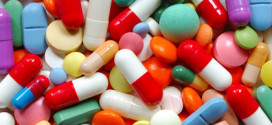Beta Ecdysterone has been around for a long time, way over 30 years, however it wasn’t until recently that it exploded into the mainstream supplement market.
Beta Ecdysterone is a form of an ecosteriod which a naturally occurring steroid-like substance produced from plants along with another 150 or so ecosteriods. The majority are produced from plants such as Leuzea carthamoides and Brazilian ginseng.
Research into Beta Ecdysterone has suggested it has a powerful anabolic effect on muscles which is achieved by enhancing protein synthesis which subsequently leads to an increase in muscle mass. It’s also claimed that Beta Ecdysterone is a powerful growth promoter with no hormonal side effects which are associated with the other forms of anabolics.
In this article we’ll go through the research done into Beta Ecdysterone and critically appraise it, looking at whether it really does work or not.
The key claims surrounding Beta Ecdysterone are that it:
- Acts as a natural anabolic agent when taken at a dose of 5mg per kilogram
- Improves the body’s desposition to weight loss and muscle gains
- Helps to control the blood sugar levels
- Acts as an antioxidant
The majority of research into Beta Ecdysterone appears to be coming out of Russia which can make it harder to critically appraise Beta Ecdysterone and may offer problems to the credibility of Beta Ecdysterone as an anabolic agent.
Back in 1976 and through until 2005 scientists found that Beta Ecdysterone has an anabolic effect on the muscle cells of animals (rats and Japanese quail) through increasing the rate of protein synthesis. From 1988 to 2005 published research suggests that the anabolic effect can be extrapolated to humans too.
In 1988 Beta Ecdysterone was shown to have a wider anabolic effect on the proteins responsible for muscle contraction when comparing the muscle building effects of the powerful anabolic steriod methandrostenolone to Beta Ecdysterone. It was also shown in the same year that supplementing a high protein diet with Beta Ecdysterone lean muscle mass increased by 6-7% and that body fat percentage decreased by 10% which is a HUGE drop considering the trail was for 12 weeks.
In both 1971 and 2005 Beta Ecdysterone was shown to have the capability of lowering blood glucose levels for those with slightly raised blood glucose levels. However, it doesn’t work on those with a blood glucose level greater than 22.2 mmol/l. This potentially makes it a viable treatment for both type 2 diabetes and obesity. Finally, in 2002, Beta Ecdysterone was shown to have anti-tumour properties and may act as a strong adaptogen and anti-oxidant.
So does it work?
well, I believe it does, however, you need a much bigger dose than what’s recommended by a lot of supplement companies. I still also feel that further research is needed, in the form of a well-controlled trial and on a large scale, that is widely available for review purposes.
If you plan on taking Beta Ecdysterone then I would suggest taking 5mg per kilogram per day to notice the desired effects. So for an 80kg person, that would be 400mg daily combined with a high protein diet.
References
1- Bizec, B. L., Antigna, J-P., Monteau, F. and Andre, F. (2002) Ecdysteroids: one potential new anabolic family in breeding animals. Analytica Cimica Acta. 473, 89-97.
2- Chermynkh, N. S., Shimanovskii, N. L., Shutko, G. V. and Syrov, V. N. (1988) The action of methandrostenolone and ecdysterone on the physical endurance of animals and on protein metabolism in the skeletal muscles. Farmakologia I Toksikogia. 51 (6), 57-60.
3- Chen, Q., Xia, Y., and Qui, Z. (2005) Effect of ecdysterone on glucose metabolism in Vitro. Life Sciences. Article In Press.
4- Dinan, L (2001) Phytoecdysteroids: biological aspects. Phytochemistry. 57 (3), 325-39.
5- Konovolova, N. P., Mitrokhin, I. And Volkova, L. M. (2002) Ecdysterone modulates antitomour activity of cytostatics and biosynthesis of macromolecules in tumour-bearing animals. Izvestiya Akademic Nauk, Seriya Bilogicheskaya. 6, 650-658.
6- Kuzmenko, A. I., Morozova, R. P. and Nikolenko, I. A. (1997) Effects of vitamin D3 and ecdysterone on free-radical lipid peroxidation. Biochemistry (Mosc). 62 (6), 609-612.
7- Kuz’menko, A. I. (1999) Also a very strong adaptogen and antioxidant: antioxidant effect of 20-hydroxyecdysone in a model system. Ukranskii Biokhimicheskii Zhumal. 71 (3), 35-38.
8- Simakin, S. Yu. et al., (1998) The combined use of ecdisten and the product ‘Bodrost’ during training in cyclical types of sports. Scientific Sports Bulletin. No 2.
9- Slama, K., Koudela, K., tenora, J. and Mathova, A. (1996) Insect hormones in vertebrates: anabolic effects of 20-hydroxyecdysone in Japanese quail. Experientia 52 (7), 702-706.
10- Syrov, V. N. and Kurmukov, A. G. (1976) Anabolic activity of phytoecdyserone-ecdysterone isolated from Rhaponticum carthamoides. Farmakologia I Toksikogia. 39 (6), 690-693.
11- Yoshida, T., Otaka, T., Uchiyama, M. and Ogawa, S. (1971) Effect of ecdysteone on hyperglycemia in experimental animals. Biochemical Pharmacology. 20, 3263-3268..
 Supplement Judge Unbiased Supplement Reviews – Do they really work??
Supplement Judge Unbiased Supplement Reviews – Do they really work??





[…] [6] http://www.supplementjudge.net/does-it-work/all-about-the-beta-ecdysterone-hype/ […]
Great overall info on beta ecdysterone, but I’m wondering if you’ve found any other benefits it can give? From my research (link in site field) it seems some of the latest studies are showing it improves bone and joint health as well.
Hey Chester,
I would have to agree with you. Beta ecdysterone has been shown to improve bone health indirectly through increasing testosterone concentrations within the body. Not too sure about the joint effects though